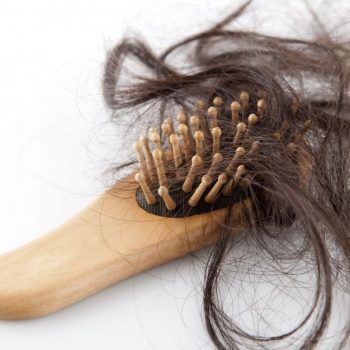

Have you been struggling to take control of your hair loss? Many individuals struggle with thinning hair as they age and many are eager — some desperate — to try anything that could stop this devastating process. Everyone loses hair, but some women lose more than others. Hair loss can become emotional and the loss of hair can be a stressful experience, as appearances are important and many women experience a degree of personal loss and declining self-confidence as they lose hair.
It can be very difficult to determine the causes of hair loss. Aside from some of the more obvious culprits, such as poor handling of the hair, frequent dying, and extensive use of hair extensions, there exist other causes of hair loss that are not as well known. From my clinical experience, I have seen the following four chronic problems lead to hair loss:
- Poor Gut Health
- Nutritional Deficiencies
- Hormone Imbalances
- Stress
Let’s take a deeper dive into these hair loss triggers.
Gut Health
Many people aren’t aware of the influence their gastrointestinal systems have on hair growth and loss, but having optimal digestion and absorption of nutrients is absolutely essential for healthy hair growth. Hair is made up of amino acids, which can be found in protein. If your diet is lacking in protein — or if you are low on stomach acid or digestive enzymes necessary to break down the protein you eat — your hair may not be in the shape you prefer.
So what can impact digestion? Not only can autoimmune diseases like Celiac impact digestion, but food sensitivities can also stress our guts, increase inflammation, and compromise our ability to gain sufficient nutrition from the foods we eat.
How do you discover and fix this? Get tested for food sensitivities and change your diet! Keep in mind, if you do discover a gluten or dairy sensitivity, you’ll want to stop using hair products that contain those proteins, as their presence will further compromise healthy hair regeneration.
Nutritional Deficiencies
Nutritional deficiencies stemming from poor diet or poor gut health can lead to hair loss. The most common nutrient deficiencies for hair loss include lack of: protein, omegas, iron, and B Vitamins. To know your risk, have iron and ferritin (iron stores) tested in your blood. A functional medicine provider can test nutrient levels to see if you really do need more amino acids, more omegas, or more B Vitamins like Biotin.
Learn more about my favorite Omega 3 product.
Hormone Imbalances
There are many different types of hormone imbalances that can lead to hair loss. High and low hormone levels, such as in your thyroid, can also contribute. Have your TSH, Free T4, Free T3, Reverse T3, and thyroid antibody levels tested. Additionally, low and high sex hormones can also contribute to hair loss. I often examine the legs of my male patients. Why? If they have no hair growth, they likely have low testosterone. Hair loss often accompanies the mid-life change of Menopause (in women) and Andropause (in men) due to hormone decline.
Testosterone can convert (using the 5 alpha reductase enzyme) to another hormone called dihydrotestosterone (DHT), which can cause thinning of the hair follicle. You can combat hair loss by seeking various natural and pharmaceutical 5 alpha reductase blockers (often called DHT blockers). Saw palmetto is a well-known DHT blocker that I’ve successfully used with my patients.
Progesterone is also a natural DHT blocker you don’t want to be low on. In addition to thyroid levels, have your sex hormone levels tested including: estrone, estradiol, progesterone, testosterone and even DHT.
If you are suspicious hormone imbalances are contributing to your loss, get your levels tested and learn more about my favorite hair loss product for my high androgen patients.
Stress
Finally, we’ve all been told that stress can cause hair loss, but why? Stress is our body’s biggest hormone hijacker. When you are stressed, your body makes LESS thyroid hormone and LESS sex hormones like progesterone. Find a functional medicine provider who can test your gut health and assess for nutritional and hormone deficiencies so that the impact of stress is less detrimental and you see fewer impacts on your hair. You can also work to manage your stress by incorporating stress reduction techniques like yoga, meditation and deep breathing into your daily routine.
Addressing any known medical, physical, or emotional challenge takes time and commitment, but resources exist to help aid your body – including your hair!
By finding a functional medicine provider and exploring each of the common hair loss triggers above, you can take back control of your hair loss!
For my favorite non-toxic hair products, please click here.


